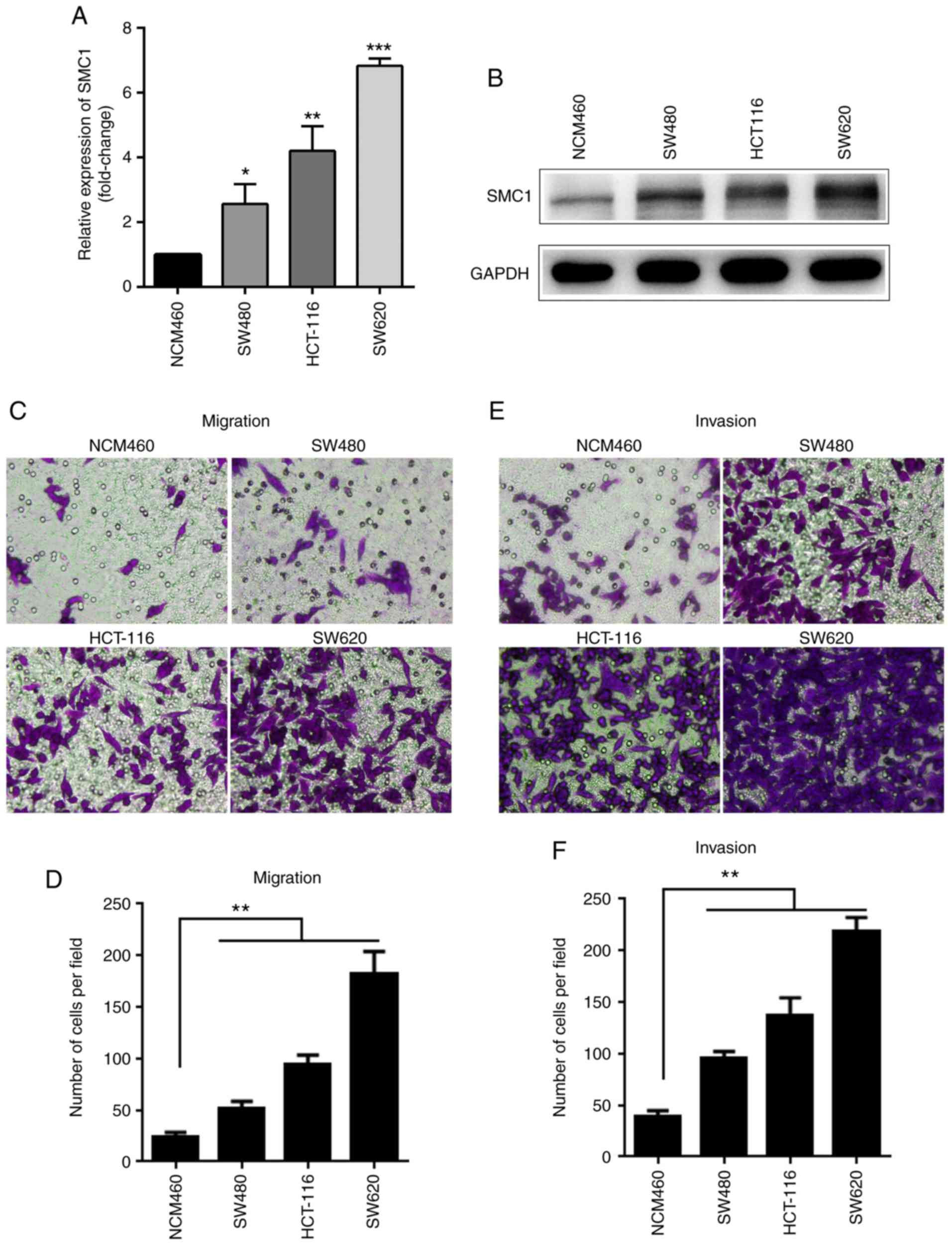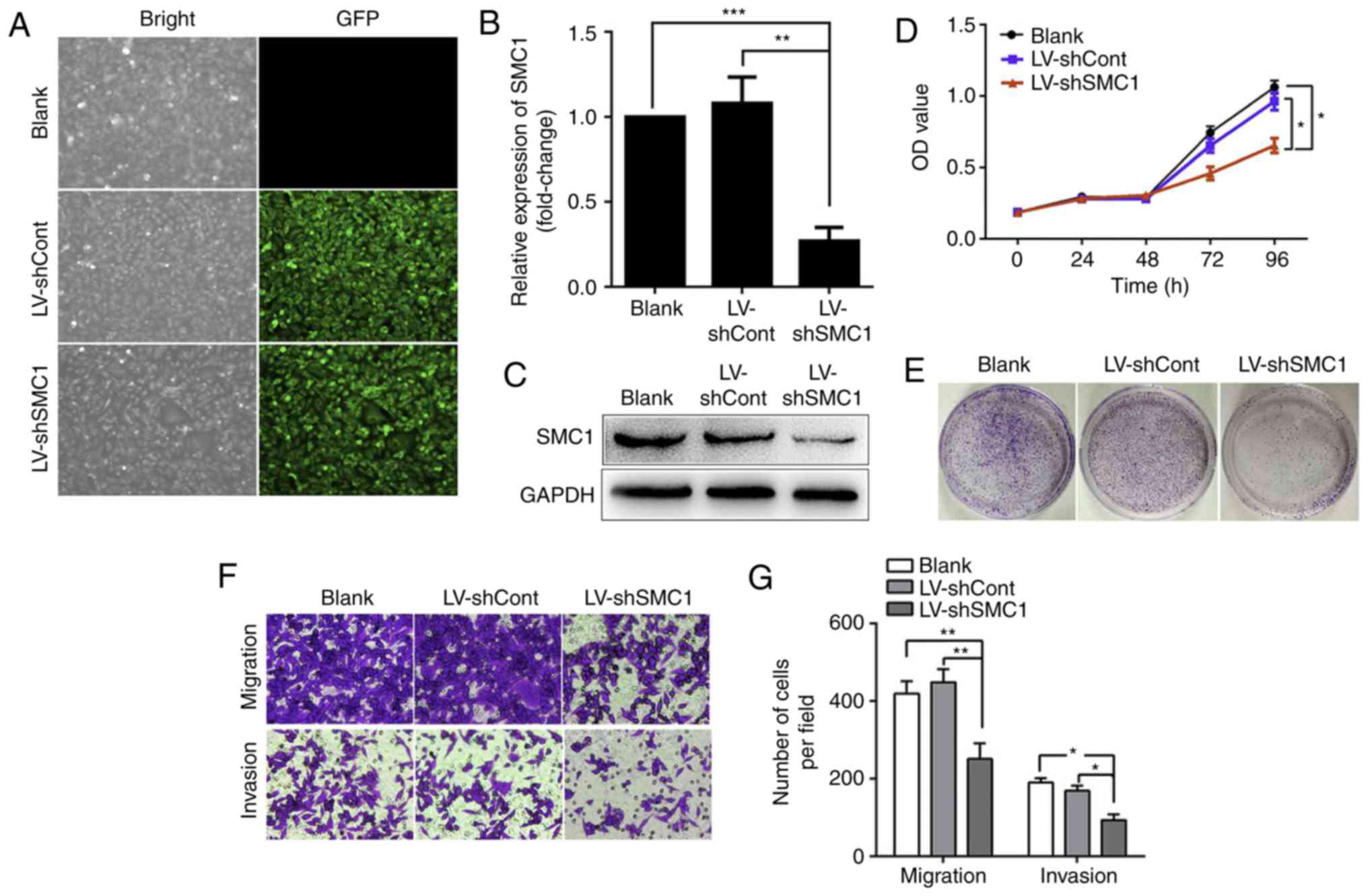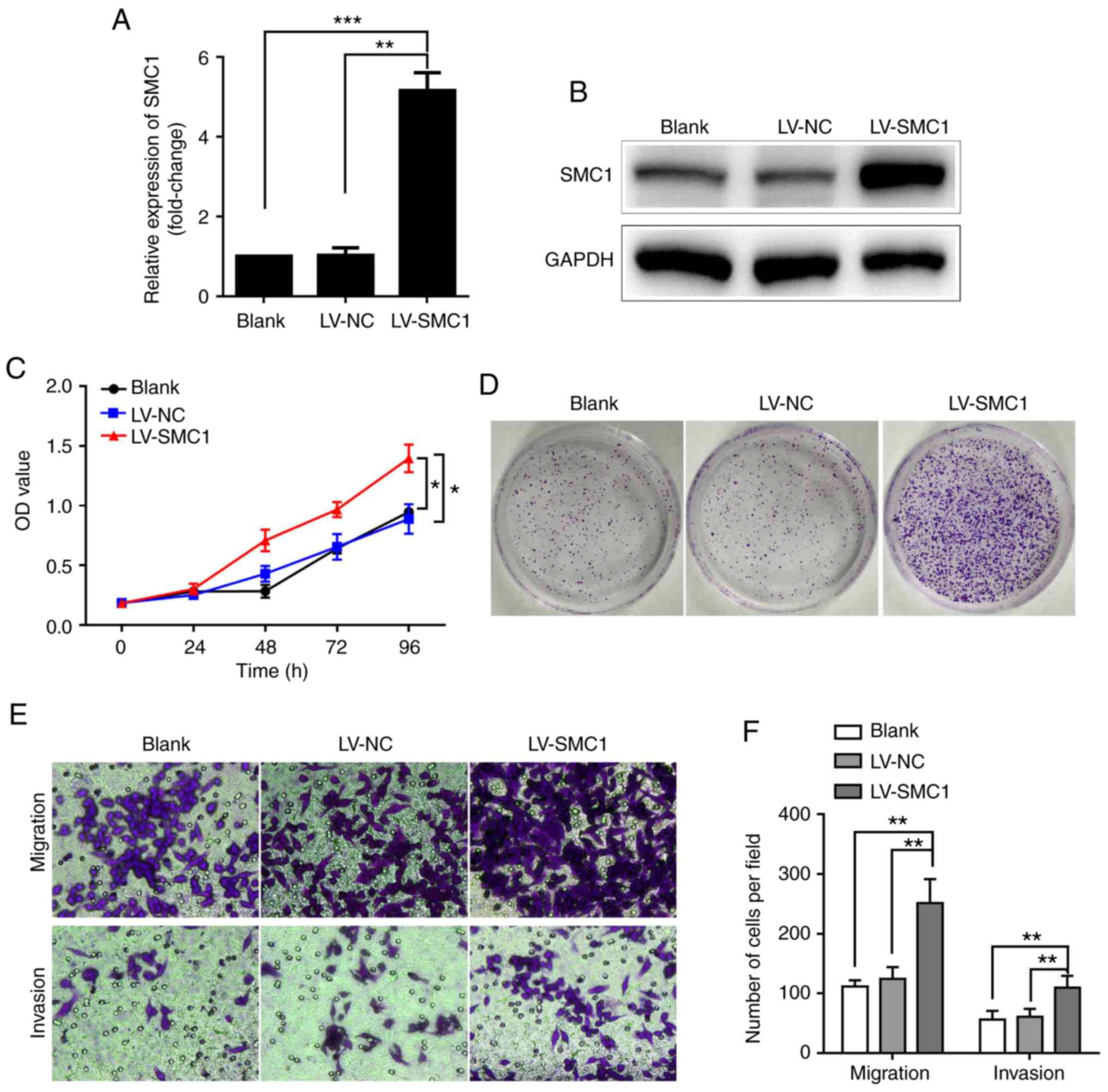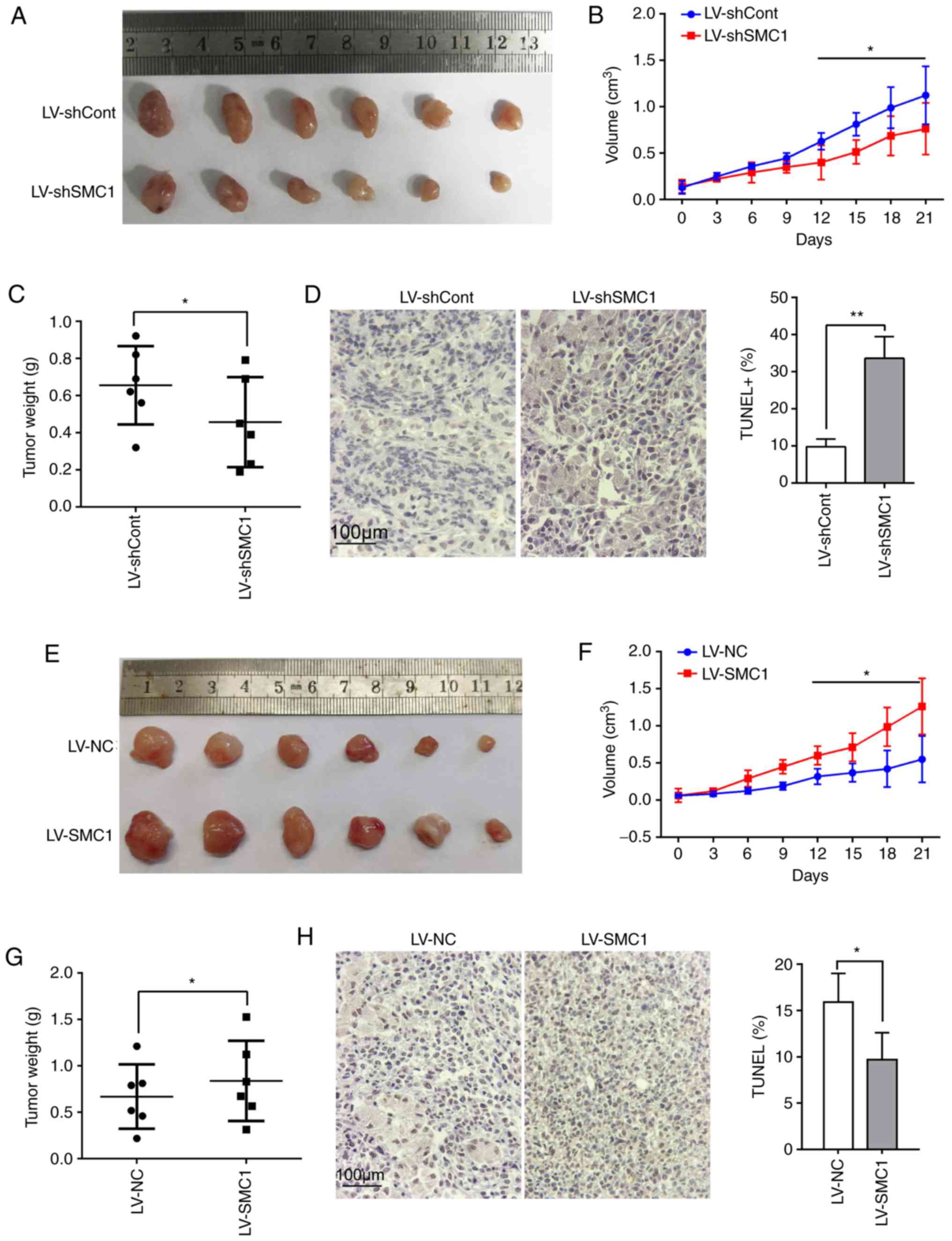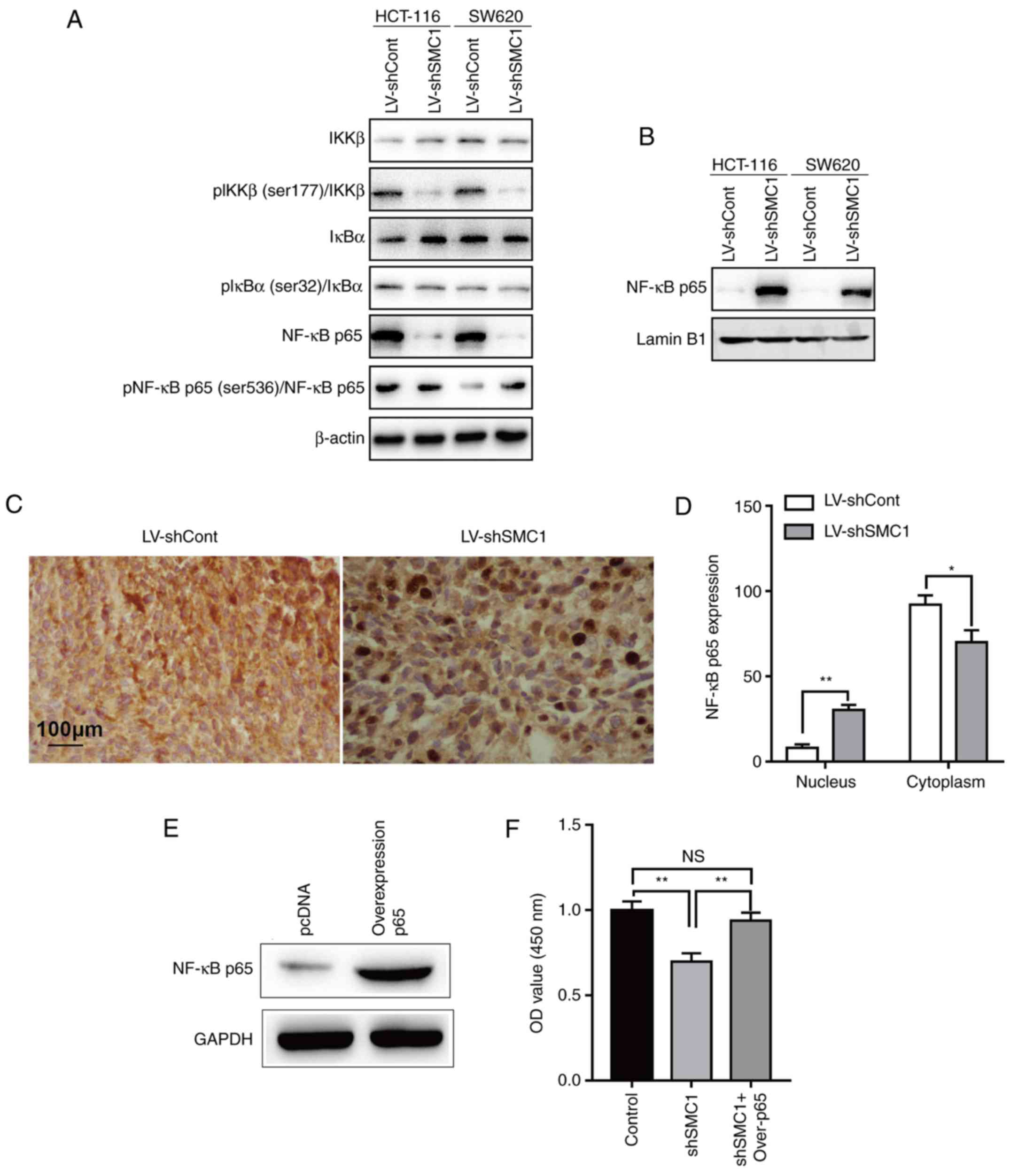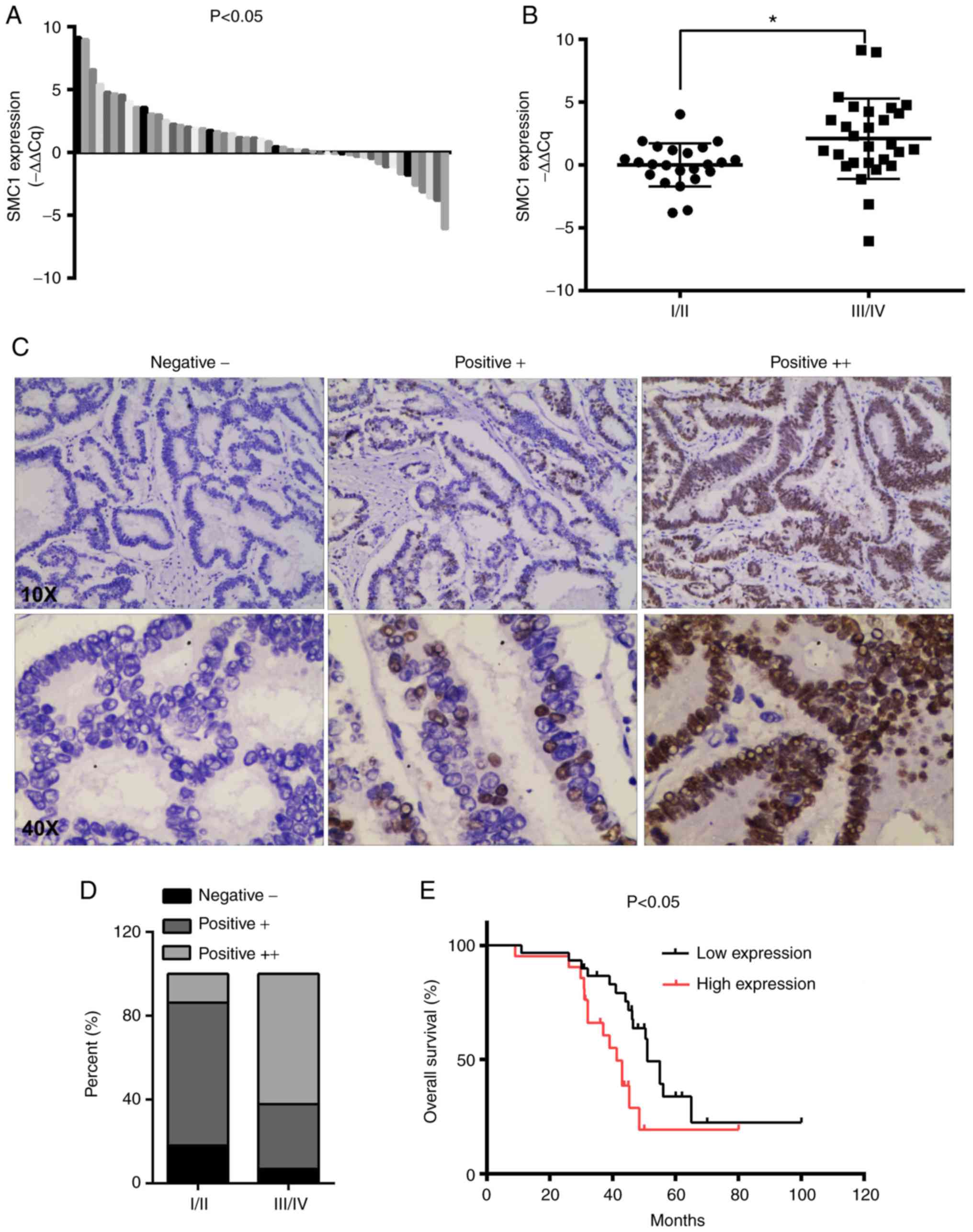|
1
|
Siegel RL, Miller KD, Fedewa SA, Ahnen DJ,
Meester RG, Barzi A and Jemal A: Colorectal cancer statistics,
2017. CA Cancer J Clin. 67:177–193. 2017. View Article : Google Scholar : PubMed/NCBI
|
|
2
|
Jemal A, Ward EM, Johnson CJ, Cronin KA,
Ma J, Ryerson B, Mariotto A, Lake AJ, Wilson R, Sherman RL, et al:
Annual report to the nation on the status of cancer, 1975–2014,
featuring survival. J Natl Cancer Inst. 109:2017. View Article : Google Scholar
|
|
3
|
Harrison S and Benziger H: The molecular
biology of colorectal carcinoma and its implications: A review.
Surgeon. 9:200–210. 2011. View Article : Google Scholar : PubMed/NCBI
|
|
4
|
Peters U, Bien S and Zubair N: Genetic
architecture of colorectal cancer. Gut. 64:1623–1636. 2015.
View Article : Google Scholar : PubMed/NCBI
|
|
5
|
Fiedler D, Heselmeyer-Haddad K, Hirsch D,
Hernandez LS, Torres I, Wangsa D, Hu Y, Zapata L, Rueschoff J,
Belle S, et al: Single-cell genetic analysis of clonal dynamics in
colorectal adenomas indicates CDX2 gain as a predictor of
recurrence. Int J Cancer. 144:1561–1573. 2019.PubMed/NCBI
|
|
6
|
Barresi V, Castorina S, Musso N, Capizzi
C, Luca T, Privitera G and Condorelli DF: Chromosomal instability
analysis and regional tumor heterogeneity in colon cancer. Cancer
Genet. 210:9–21. 2017. View Article : Google Scholar : PubMed/NCBI
|
|
7
|
Librelotto CS, Simon D, de Souza AP,
Alvares-da-Silva MR and Dihl RR: Chromosomal instability and
cytotoxicity induced by ribavirin: Comparative analysis in cell
lines with different drug-metabolizing profiles. Drug Chem Toxicol.
42:343–348. 2019. View Article : Google Scholar : PubMed/NCBI
|
|
8
|
McClelland SE: Role of chromosomal
instability in cancer progression. Endocrine-Related Cancer.
24:T23–T31. 2017. View Article : Google Scholar : PubMed/NCBI
|
|
9
|
Sideris M and Papagrigoriadis S: Molecular
biomarkers and classification models in the evaluation of the
prognosis of colorectal cancer. Anticancer Res. 34:2061–2068.
2014.PubMed/NCBI
|
|
10
|
Marginean EC and Melosky B: Is there a
role for programmed death ligand-1 testing and immunotherapy in
colorectal cancer with microsatellite instability? Part
I-colorectal cancer: Microsatellite instability, testing, and
clinical implications. Arch Pathol Lab Med. 142:17–25. 2018.
View Article : Google Scholar : PubMed/NCBI
|
|
11
|
Hirano T: At the heart of the chromosome:
SMC proteins in action. Nat Rev Mol Cell Biol. 7:311–322. 2006.
View Article : Google Scholar : PubMed/NCBI
|
|
12
|
Huber RG, Kulemzina I, Ang K, Chavda AP,
Suranthran S, Teh JT, Kenanov D, Liu G, Rancati G, Szmyd R, et al:
Impairing cohesin Smc1/3 head engagement compensates for the lack
of Eco1 function. Structure. 24:1991–1999. 2016. View Article : Google Scholar : PubMed/NCBI
|
|
13
|
Schar P, Fasi M and Jessberger R: SMC1
coordinates DNA double-strand break repair pathways. Nucleic Acids
Res. 32:3921–3929. 2004. View Article : Google Scholar : PubMed/NCBI
|
|
14
|
Bauerschmidt C, Woodcock M, Stevens DL,
Hill MA, Rothkamm K and Helleday T: Cohesin phosphorylation and
mobility of SMC1 at ionizing radiation-induced DNA double-strand
breaks in human cells. Exp Cell Res. 317:330–337. 2011. View Article : Google Scholar : PubMed/NCBI
|
|
15
|
Luo Y, Deng X, Cheng F, Li Y and Qiu J:
SMC1-mediated intra-S-phase arrest facilitates bocavirus DNA
replication. J Virol. 87:4017–4032. 2013. View Article : Google Scholar : PubMed/NCBI
|
|
16
|
Laugsch M, Seebach J, Schnittler H and
Jessberger R: Imbalance of SMC1 and SMC3 cohesins causes specific
and distinct effects. PLoS One. 8:e651492013. View Article : Google Scholar : PubMed/NCBI
|
|
17
|
Yi F, Wang Z, Liu J, Zhang Y, Wang Z, Xu
H, Li X, Bai N, Cao L and Song X: Structural maintenance of
chromosomes protein 1: Role in genome stability and tumorigenesis.
Int J Biol Sci. 13:1092–1099. 2017. View Article : Google Scholar : PubMed/NCBI
|
|
18
|
Kitagawa R, Bakkenist CJ, McKinnon PJ and
Kastan MB: Phosphorylation of SMC1 is a critical downstream event
in the ATM-NBS1-BRCA1 pathway. Genes Dev. 18:1423–1438. 2004.
View Article : Google Scholar : PubMed/NCBI
|
|
19
|
Livak KJ and Schmittgen TD: Analysis of
relative gene expression data using real-time quantitative PCR and
the 2(-Delta Delta C(T)) method. Methods. 25:402–408. 2001.
View Article : Google Scholar : PubMed/NCBI
|
|
20
|
Musio A, Selicorni A, Focarelli ML,
Gervasini C, Milani D, Russo S, Vezzoni P and Larizza L: X-linked
Cornelia de lange syndrome owing to SMC1L1 mutations. Nat Genet.
38:528–530. 2006. View
Article : Google Scholar : PubMed/NCBI
|
|
21
|
Wang J, Yu S, Cui L, Wang W, Li J, Wang K
and Lao X: Role of SMC1A overexpression as a predictor of poor
prognosis in late stage colorectal cancer. BMC Cancer. 15:902015.
View Article : Google Scholar : PubMed/NCBI
|
|
22
|
Li J, Feng W, Chen L and He J:
Downregulation of SMC1A inhibits growth and increases apoptosis and
chemosensitivity of colorectal cancer cells. J Int Med Res.
44:67–74. 2016. View Article : Google Scholar : PubMed/NCBI
|
|
23
|
Brierley JD, Gospodarowicz MK and
Wittekind C: TNM classification of malignant tumours, 8th edition.
Hoboken. Wiley–Blackwell. 2016.
|
|
24
|
Bharti AC and Aggarwal BB: Chemopreventive
agents induce suppression of nuclear factor-κB leading to
chemosensitization. Ann NY Acad Sci. 973:392–395. 2002. View Article : Google Scholar : PubMed/NCBI
|
|
25
|
van Ruiten MS and Rowland BD: SMC
Complexes: Universal DNA looping machines with distinct regulators.
Trends Genet. 34:477–487. 2018. View Article : Google Scholar : PubMed/NCBI
|
|
26
|
Alt A, Dang HQ, Wells OS, Polo LM, Smith
MA, McGregor GA, Welte T, Lehmann AR, Pearl LH, Murray JM and
Oliver AW: Specialized interfaces of Smc5/6 control hinge stability
and DNA association. Nat Commun. 8:140112017. View Article : Google Scholar : PubMed/NCBI
|
|
27
|
Mannini L, Liu J, Krantz ID and Musio A:
Spectrum and consequences of SMC1A mutations: The unexpected
involvement of a core component of cohesin in human disease. Hum
Mutat. 31:5–10. 2010. View Article : Google Scholar : PubMed/NCBI
|
|
28
|
Misulovin Z, Pherson M, Gause M and
Dorsett D: Brca2, Pds5 and Wapl differentially control cohesin
chromosome association and function. PLoS Genet. 14:e10072252018.
View Article : Google Scholar : PubMed/NCBI
|
|
29
|
Kakui Y and Uhlmann F: SMC complexes
orchestrate the mitotic chromatin interaction landscape. Curr
Genet. 64:335–339. 2018. View Article : Google Scholar : PubMed/NCBI
|
|
30
|
Gdula MR, Nesterova TB, Pintacuda G,
Godwin J, Zhan Y, Ozadam H, McClellan M, Moralli D, Krueger F,
Green CM, et al: The non-canonical SMC protein SmcHD1 antagonises
TAD formation and compartmentalisation on the inactive X
chromosome. Nat Commun. 10:302019. View Article : Google Scholar : PubMed/NCBI
|
|
31
|
Mussbacher M, Salzmann M, Brostjan C,
Hoesel B, Schoergenhofer C, Datler H, Hohensinner P, Basílio J,
Petzelbauer P, Assinger A and Schmid JA: Cell type-specific roles
of NF-κB linking inflammation and thrombosis. Front Immunol.
10:852019. View Article : Google Scholar : PubMed/NCBI
|
|
32
|
Kang I, Yoon DW, Braun KR and Wight TN:
Expression of versican V3 by arterial smooth muscle cells alters
tumor growth factor β (TGFβ)-, epidermal growth factor (EGF)-, and
nuclear factor κB (NFκB)-dependent signaling pathways, creating a
microenvironment that resists monocyte adhesion. J Biol Chem.
289:15393–15404. 2014. View Article : Google Scholar : PubMed/NCBI
|
|
33
|
Meng F, Zhang S, Song R, Liu Y, Wang J,
Liang Y, Wang J, Han J, Song X, Lu Z, et al: NCAPG2 overexpression
promotes hepatocellular carcinoma proliferation and metastasis
through activating the STAT3 and NF-κB/miR-188-3p pathways.
EBioMedicine. 44:237–249. 2019. View Article : Google Scholar : PubMed/NCBI
|















